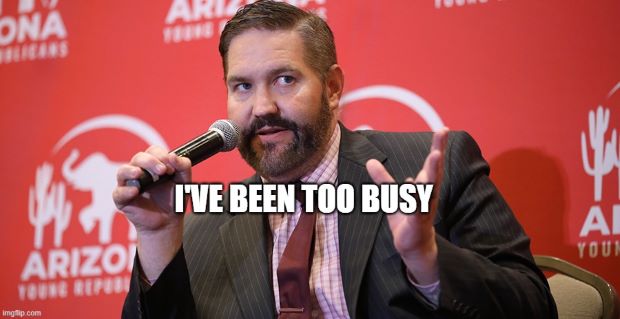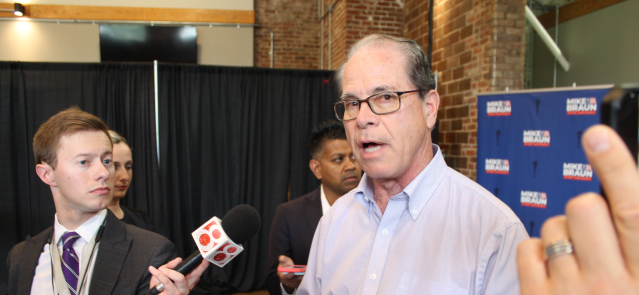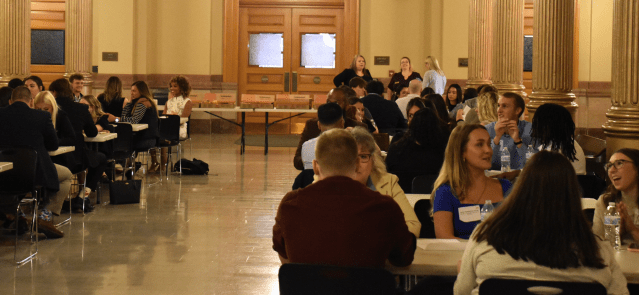Happy Friday!
Jarred Meeks reports on Democratic gubernatorial nominee Jennifer McCormick’s update to her marijuana plan. And GOP gubernatorial nominee Mike Braun told Brian Howey he plans to “plow through” the nonessential rhetoric pervasive this election cycle. More news below. — Howey Politics Indiana/State Affairs
Braun to focus on ‘kitchen table’ issues: “I’ve been clear I’m going to focus on the issues that are on the kitchen table, not the ones that are inherently divisive,” the Republican gubernatorial nominee said when asked to comment on the pervasive election rhetoric. (Howey, State Affairs)
McCormick envisions path to marijuana legalization in Indiana: The Democratic gubernatorial nominee wants to allow medical marijuana in Indiana before fully legalizing the drug for adult Hoosiers. (Meeks, State Affairs)
STATE
Judge turns down bid to broaden abortion ban exceptions: Owen County Judge Kelsey Hanlon released a decision denying a request from abortion providers for an order expanding health exceptions and lifting the state’s ban on abortion clinic licenses. (Davies, State Affairs)
Student attendance improved last school year, but more work remains, officials say: More than 205,000 Hoosier students (17.8%) were chronically absent in the 2023-24 school year — meaning they missed at least 10% of school days — down from more than 220,000 (19.2%) during the 2022-23 school year and over 237,000 (21.1%) during the 2021-22 school year. (Meeks, State Affairs)
Pandemic school funding to sunset as Indiana asks for spending extension: School officials face a January deadline to spend what remains of the state’s $2.9 billion aid package for COVID-19-related projects, but they can request an extension from the U.S. Department of Education. (Cassel, WFYI-FM)
New state dashboard will flag students at risk of not graduating on time: The Indiana Department of Education previewed a new dashboard for schools that will flag students who may not be on track to graduate on schedule. (Adair, Lakeshore Public Media)
Indiana students say cost is biggest barrier to college: Indiana high school students are skipping college because of concerns about costs and uncertainty about what careers to pursue, according to new research from the Indiana Commission for Higher Education. (McCoy, WFYI-FM)
Execution date set for Fort Wayne man who killed 4 people in 1997: Indiana is expected to conduct its first execution since 2009 after the state Supreme Court ordered that Joseph Corcoran be executed before sunrise Dec. 18. (Gay, Fox59)
Portage mayor, Porter County Council unhappy after Gov. Holcomb yanks appointment to RDA: Portage Mayor Austin Bonta and Porter County Council members aren’t happy with Gov. Eric Holcomb’s removal of the city’s pick to serve on the Regional Development Authority after just three weeks into what was expected to be a four-year term. (Jones, Post-Tribune)
Wayne County prosecutor criticizes Rokita’s antisemitism training as political grandstanding: Longtime Wayne County Prosecutor Michael Shipman accused fellow Republican Attorney General Todd Rokita of misusing his position to grandstand and further his political ambitions by promoting training to combat antisemitism for local prosecutors and law enforcement. (Smith, WFIU-FM)
Jury finds IU’s sexual misconduct policy discriminatory: After a two-day trial, an Indianapolis jury found Indiana University guilty of discrimination in a sexual misconduct investigation in a verdict that challenges the legality of IU’s misconduct policies. (Sandweiss, WFIU-FM)
Today: Notre Dame to inaugurate new president — The University of Notre Dame will inaugurate its new president, the Rev. Robert A. Dowd, who will preside over a 10 a.m. inauguration Mass at the Basilica of the Sacred Heart and attend an inauguration ceremony set for 2:45 at Purcell Pavilion in South Bend. (Parrott, WVPE-FM)
LOCAL
Residents of 3 counties oppose proposed bottled water plant in Noble County: A proposed bottled water plant that would be located next to Pisgah Marsh in Noble County has drawn the ire of some residents in Noble and in bordering Kosciusko and Whitley counties. (McMahan, WANE-TV)
Hogsett says he won’t resign as he faces questions about sexual harassment response: Indianapolis Mayor Joe Hogsett said he will not resign despite concerns over his handling of sexual harassment claims against his former chief of staff, Thomas Cook. (Colombo, IndyStar)
GENERAL ASSEMBLY
Klinker plans to reintroduce bill to raise teacher pay to $60K: U.S. Rep. Sheila Klinker, D-Lafayette, plans to reintroduce a bill she proposed last year that would raise minimum teacher salaries to $60,000 across the state. Most districts adhere to a $40,000 minimum salary as outlined in state law. (Appleton, State Affairs)
McNamara in favor of legislation on ‘signal jammers’: According to state Rep. Wendy McNamara, R-Evansville, an alleged burglary made her realize the Legislature needed to address the issue of signal jammers, devices that scramble Wi-Fi and cellular signals and are illegal to operate under federal law. (Loesch, Courier & Press)
Audit and financial reporting subcommittee to meet Sept. 17: A calendar notice announced the Legislative Council Audit and Financial Reporting Subcommittee will meet at 10 a.m. in Room 431 at the Statehouse. (Howey Politics Indiana/State Affairs)
CONGRESS
Sen. Young, bipartisan group push education department to help ensure schools can meet new transparency rules: U.S. Sen. Todd Young, R-Ind., announced he joined a bipartisan group to send a letter to the U.S. Department of Education in support of delaying the institutional reporting deadline for the new Gainful Employment and Financial Value Transparency regulations to July 2025. (Howey Politics Indiana/State Affairs)
House passes version of Braun’s agriculture oversight bill: U.S. Sen. Mike Braun, R-Ind., lauded the passage of the House version of the Protecting American Agriculture From Foreign Adversaries Act of 2024, legislation that would add scrutiny to foreign acquisition of U.S. farmland and agricultural industries. (Howey Politics Indiana/State Affairs)
Mrvan announces safe streets grants for Crown Point, Merrillville, Portage and Valparaiso: Crown Point, Merrillville and Portage will each receive $280,000 and Valparaiso will get $200,000 “to develop comprehensive safety action plans to eliminate roadway fatalities,” according to a news release from the office of U.S. Rep. Frank Mrvan, D-Ind. (Howey Politics Indiana/State Affairs)
Yakym testifies on his bill to improve federal permitting process: U.S. Rep. Rudy Yakym, R-Ind., testified at a House committee hearing in support of his legislation, HR 6129, which “would streamline and improve the federal permitting process by requiring the White House Council on Environmental Quality to submit an annual report regarding litigation under the National Environmental Policy Act,” according to a news release. (Howey Politics Indiana/State Affairs)
Report: Yakym considers seeking seat on House Ways and Means — Bloomberg reported that Rep. Yakym is among several lawmakers seeking a seat on the House Ways and Means Committee in the next Congress.
Congressional schedule: The House and Senate are out.
CAMPAIGNS
Rokita’s thirst for battle isn’t going away: Rory Appleton of State Affairs dives into Todd Rokita’s first term in office in the first of a two-part look at the race for Indiana attorney general.
Wells campaign claims ‘highly competitive’ AG race in new internal poll: Destiny Wells’ campaign recently released internal polling data showing “a highly competitive race” for Indiana attorney general, with 41% supporting the Democrat, 44% supporting Republican incumbent Rokita and 13% undecided. (Gay, Fox59)
McCormick calls state’s abortion ban ‘extreme’ during Muncie town hall: Democratic gubernatorial candidate Jennifer McCormick told attendees at a town hall in Muncie that Indiana’s near-total abortion ban is “extreme” and that she believes access to contraceptives would be in danger under her opponent Mike Braun’s administration. (Ouellette, WFIU-FM)
PRESIDENTIAL 2024
Harris, Trump paint polar opposite visions for America: Brian Howey of State Affairs provides his analysis of Tuesday night’s debate between Democratic and Republican presidential candidates Vice President Kamala Harris and former President Donald Trump.
Trump says he won’t do another debate with Harris: Former President Trump said he would not participate in another debate with Vice President Harris, squashing the potential for a second meeting between the two candidates before Election Day. (The Hill)
NATION
Election betting goes mainstream: The popular trading platform Interactive Brokers plans to launch a market where investors can bet on the outcome of the presidential election, taking advantage of a federal court ruling that has effectively legalized election betting in the U.S. (The Wall Street Journal)
White House schedule: President Joe Biden will deliver remarks at a brunch in celebration of Black excellence at noon. In the afternoon, he will host a bilateral meeting with Prime Minister Keir Starmer of the United Kingdom before traveling to Wilmington, Delaware. Vice President Kamala Harris will travel to Wilkes-Barre, Pennsylvania, for an evening campaign event and return to Washington, D.C., afterward.




